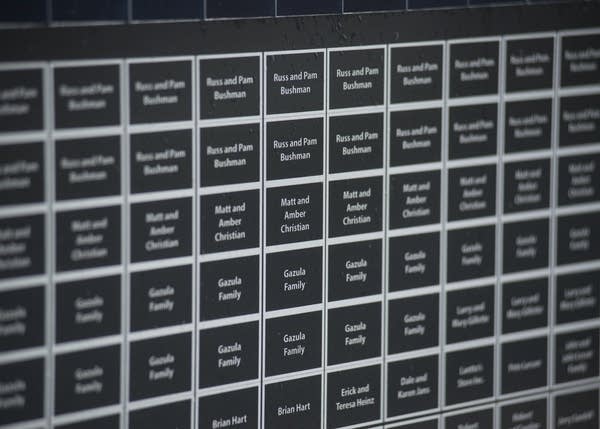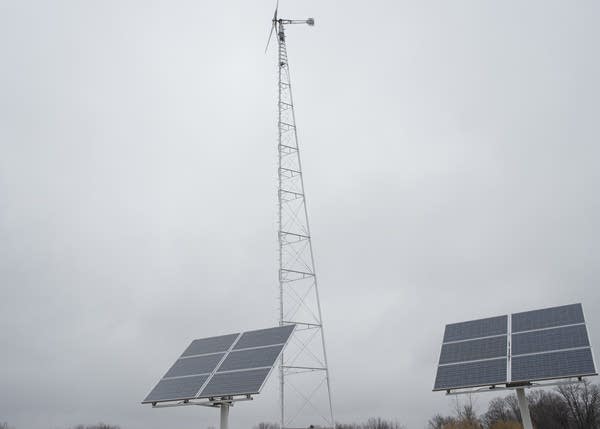Solar gardens: Minnesota attorney general pursues complaints

The Minnesota attorney general's office is receiving an increasing number of complaints from people around the state about offers to subscribe to solar gardens. Some complaints are about the high volume of offers, and others are from solar garden subscribers who worry they have been ripped off.
Solar gardens are a way for people to buy solar power without installing panels on their homes. Energy companies build the large banks of panels and lease their power output to subscribers, who receive credit on their electricity bills.
But a lot of people are confused about whether the offers they are receiving in the mail or via social media make sense for them — and according to Deputy Attorney General James Canaday, they're right to be confused.
"The solar garden business is very new," he said. "It's the Wild West right now."
Create a More Connected Minnesota
MPR News is your trusted resource for the news you need. With your support, MPR News brings accessible, courageous journalism and authentic conversation to everyone - free of paywalls and barriers. Your gift makes a difference.
Minnesota is at the beginning of a major solar garden expansion. There are only 17 functioning solar gardens in the state. By the end of the year that's expected to grow to 200.

The vast majority of those new projects are in Xcel Energy territory. But other utilities around the state are offering their own programs.
Each solar garden across the state works a little differently. Some require large upfront payments, while others bill monthly. Most promise long-term cost savings, and nearly all solar gardens ask subscribers to sign 20- to 25-year contracts.
20-year contracts raise red flags
The length of the contracts, Canaday said, raise some red flags. Very few purchases require such a long commitment. The 20-year contract, he said, puts subscribing to a solar garden on par with buying a house, managing a retirement nest egg or buying stock in a company.
Those contracts, he said, are very complicated and highly regulated by government agencies. Solar gardens are just as complex, but not regulated.
In 2013 state legislators passed a law requiring utilities to get 1.5 percent of their electricity from solar power by 2020. That law also called for Xcel Energy to create a community solar garden program.
At the same time, the federal government offered a 30 percent tax credit to offset solar garden construction costs that was originally set to expire in 2016.

The tax credit deadline was recently extended by four years but a large volume of solar projects were already underway. That's why 2016 is slated for such a large solar expansion.
Three years ago, when the law was in draft form, Canaday's office asked the Public Utilities Commission to vet all solar garden contracts and marketing materials before approving projects.
"The PUC declined to enact those safeguards," he said.
That means that no government agency has verified the cost-saving claims or contract terms on the marketing materials many Minnesotans have received. According to Canaday, the contracts are not even vetted by Xcel.
Xcel strategy director Lee Gabler said the utility works with outside contractors like Denver-based SunShare and Pennsylvania-based Community Energy Solar to build and maintain solar gardens. Those outside companies also handle marketing and subscriptions.
"Our contractors are advertising the gardens," he said. "There's a door-to-door campaign."
Xcel takes no responsibility for the claims and contracts offered by garden operators.
"We don't believe we are liable for potential marketing fraud on the part of third party developers," Xcel lawyers said in November 2013 legal correspondence with the attorney general's office, leading up to the AG's recommendation to the PUC. "Responsibility for understanding the contract terms is ultimately with the subscriber."
The PUC did respond immediately to inquiries about solar gardens.
Solar subscribers unclear about contracts
Potential subscribers are left to make long-term financial decisions with little to no consumer protection. Even those that are careful sometimes don't know what they're getting into.
Dan Buhr, a south Minneapolis insurance analyst, recently subscribed to a solar garden built by SunShare.
He wanted to help the environment. Solar gardens seemed like a good way to do it while still saving money.
SunShare offered a pay-as-you-go contract. Buhr would pay SunShare 13 cents per kilowatt-hour generated by his solar panel subscription, with that rate increasing slightly each year over a 25-year contract.
Buhr's solar power would be subtracted from his regular Xcel bill. SunShare projects its solar power will be cheaper than power from the grid, saving Buhr between $5 and $50 a month over the life of his contract.

It sounded like a good deal, so Buhr signed up, paying a $100 subscription fee on the spot. A few months later he saw no change to his Xcel bill.
"I wasn't sure what was going on," he said. "So I called."
He learned his SunShare garden was still just an empty farm field. It's slated for construction by the end of this year.
Buhr said it was just a misunderstanding. He's still happy with the contract he signed but others like him, Canaday said, are calling the attorney general's office, wondering if the money they paid is safe.
"Many people have the desire to go green," Canaday said. "Companies and marketers are aware of that. We've seen consumer fraud in the past that targeted consumers with a message of going green. Consumers need to keep that in mind and do their homework."
Canaday couldn't comment on any investigations moving forward, saying only that his office is following up on recent complaints. He would not specify the number of complaints.
Solar gardens might be a great deal for some people, he said, but there are a few factors to keep in mind.
The solar garden marketing pamphlets landing in mailboxes right now often carry the Xcel name and logo. Xcel has been around a long time and people trust the name.
But Xcel's solar program is operated by outside companies — many of which formed recently with the fledgling solar industry.
"You need to do your research," he said. "You need to know how long that company has been around, and if they're likely to stay around."
He also said it's important to know how to get out of a contract. A lot can happen in 20 years. People move. Technology advances.
Without a good understanding of the fine print, a subscriber might be saddled with exit fees or expensive outdated technology.